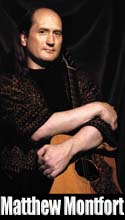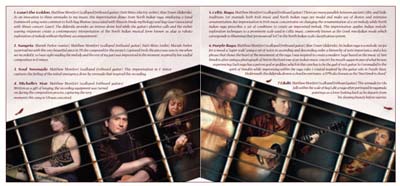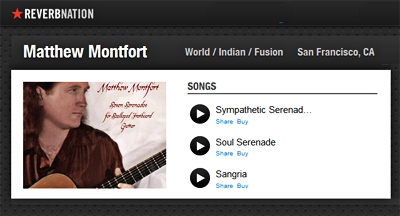 Matthew holds a B.A. in World Music and Composition and an M.A. in Arts
and Media Technology from Antioch University and has studied with the master
musicians of many world music traditions. He is on the faculty of Blue Bear
School of Music in San Francisco, where he teaches all styles of guitar as
well as rhythm classes based on his book "Ancient Traditions--Future
Possibilities: Rhythmic Training Through the Traditions of Africa, Bali and
India." He is the leader of the world fusion music ensemble "Ancient
Future" and a pioneer of the scalloped fretboard guitar (an instrument
combining qualities of the South Indian vina and the steel string guitar).
Matthew says he has always had an attraction to the guitar, and has been
influenced by and involved in music his entire life. His love of the guitar
grew from two things. One of them is his older half brother Rick Epting who
played guitar in a professional folk music group when he was still in his
crib and he always wanted to play like him. This desire to create and play
music was evident in high school where he and a childhood friend, Benjy
Wertheimer, dreamt about forming a band together. While in high school
Matthew launched his musical career, playing guitar professionally with
several local bands in the Boulder area. Also during this time, Benjy
Wertheimer developed an interest in percussion, and was attracted to Indian
tabla drums in particular. Through a friend of Wertheimer's Matthew heard a
record by the Diga Rhythm Band, which featured North Indian tabla master
Zakir Hussain and his students along with Grateful Dead drummer Mickey Hart
and guitarist Jerry Garcia. This experience created an interest in Indian
rhythms, which prompted Matthew to blend this style of music into his
jazz/rock/classical fusion music. In 1977 Matthew and Benjy journeyed to San
Rafael, California to study North Indian classical music at the Ali Akbar
College of Music. They met and combined with members of the Diga Rhythm Band
to form the "Greenhouse Intergalactic" band. Greenhouse Intergalactic
rehearsed at the Grateful Dead studio and performed a number of concerts
before splitting up into two groups in 1978: a Latin band called "Sun
Orchestra", and the world fusion music group "
Ancient Future".
Matthew holds a B.A. in World Music and Composition and an M.A. in Arts
and Media Technology from Antioch University and has studied with the master
musicians of many world music traditions. He is on the faculty of Blue Bear
School of Music in San Francisco, where he teaches all styles of guitar as
well as rhythm classes based on his book "Ancient Traditions--Future
Possibilities: Rhythmic Training Through the Traditions of Africa, Bali and
India." He is the leader of the world fusion music ensemble "Ancient
Future" and a pioneer of the scalloped fretboard guitar (an instrument
combining qualities of the South Indian vina and the steel string guitar).
Matthew says he has always had an attraction to the guitar, and has been
influenced by and involved in music his entire life. His love of the guitar
grew from two things. One of them is his older half brother Rick Epting who
played guitar in a professional folk music group when he was still in his
crib and he always wanted to play like him. This desire to create and play
music was evident in high school where he and a childhood friend, Benjy
Wertheimer, dreamt about forming a band together. While in high school
Matthew launched his musical career, playing guitar professionally with
several local bands in the Boulder area. Also during this time, Benjy
Wertheimer developed an interest in percussion, and was attracted to Indian
tabla drums in particular. Through a friend of Wertheimer's Matthew heard a
record by the Diga Rhythm Band, which featured North Indian tabla master
Zakir Hussain and his students along with Grateful Dead drummer Mickey Hart
and guitarist Jerry Garcia. This experience created an interest in Indian
rhythms, which prompted Matthew to blend this style of music into his
jazz/rock/classical fusion music. In 1977 Matthew and Benjy journeyed to San
Rafael, California to study North Indian classical music at the Ali Akbar
College of Music. They met and combined with members of the Diga Rhythm Band
to form the "Greenhouse Intergalactic" band. Greenhouse Intergalactic
rehearsed at the Grateful Dead studio and performed a number of concerts
before splitting up into two groups in 1978: a Latin band called "Sun
Orchestra", and the world fusion music group "
Ancient Future".
Q&A:
DCB: In an article by Jello Biafra, he talks about your musical ability to reproduce the playing style of Hendrix. In the beginning, what styles of music were you attracted to. Did your musical ear and desire to learn and play music draw you to the more complex styles by the well known guitar musicians of the time?MM: I was actually attracted to the guitar for two main reasons. First of all, my older half brother Rick Epting played guitar in a professional folk music group when I was still in my crib, and I had always wanted to play like him. And when I heard the music of Jimi Hendrix and Jimmy Page, I was mesmerized by the sound of the electric guitar. It was actually the note bending ornaments that intrigued me the most. The scalloped fretboard guitar allows me to have the best of both worlds: an acoustic guitar that it is possible to play like a sitar, or like Jimi Hendrix. DCB: I read that you teach music. Is this still the case and do I have the right school identified -Blue Bear School of Music in San Francisco?
MM: I'm still teaching at my studio in San Rafael, at Blue Bear School of Music in San Francisco, and also at various institutions and centers such as the New Year's Day World Music Workshop at Esalen January 1-3, 2010. DCB: Since the forming of the "Ancient Future" band and the pursuit of sharing "world fusion music" with everyone, what have you felt about your progress to this end? We all have our doubts, at one time or another, about our path and whether we are on the right one.
MM: This path has not been an easy one, but I have no doubts that it is the right musical path for me if humanity is to survive. But to be honest, there are days when I have doubts about the fate of the human race. We have a lot of flaws! But I do feel very proud of the progress we have made on the musical front. There has also been progress on the business side, but it has been very much impeded first by the music business itself, and then by the demise of the music business, and finally by the general lack of support for all of the fine arts. Certainly if there was more support for the arts, the progress on the musical side would have been greater by now, the progress on the business side would have been much greater, and then the impact of this music on society would have been exponentially greater. So my mission is far from complete. DCB: Before I became aware of Ancient Future, I had heard a scalloped fretboard guitar played (but did not know what I was hearing exactly) by John McLaughlin. Your bio says you've been playing the instrument since the late 1970's. When did you first hear and become interested in playing the scalloped fretboard guitar?
MM: I was studying North Indian classical music at the Ali Akbar College of Music. I took up the sitar, but wanted to find a way to play Indian ornaments on the guitar while still being able to play chords. I tried a slide ring, but found that too cumbersome. Then the neck on my Gibson SJ Deluxe warped, and needed the fingerboard replaced. So I went to luthier Ervin Somogyi, and we experimented on the original fretboard with various scallop depths. I decided to have the replacement fretboard scalloped as I liked the effect. Soon after that, South Indian vina master K. S. Subramanian came to San Francisco to teach at San Francisco State, and I was able to study South Indian note bending ornaments with him intensively three days a week. DCB: From the creation of "Ancient Future" band, you have worked towards accomplishing goals relating to your music. Each album/cd release has moved you a notch more along this track. As with the original release of "Planet Passion", I see "Seven Serenades" as a step along this track. What are your plans and thoughts for the near future?
MM: I want to record new music live in concert for release on DVD and CD. There is a new program we are now unveiling: the Archive of Future Ancient Recordings. We need help from the general public raising the money for it. We've already gotten a small start on it.
ONESHEET:
From Matthew Montfort's "Seven Serenades"
 Seven serenades following the muse on the path of improvisation,
inspired and informed by the great musical traditions, but not bound by
them. Improvisations becoming compositions of longing captured at the moment
of conception. -
Seven Serenades OneSheet (PDF)
Seven serenades following the muse on the path of improvisation,
inspired and informed by the great musical traditions, but not bound by
them. Improvisations becoming compositions of longing captured at the moment
of conception. -
Seven Serenades OneSheet (PDF)
REVIEW excerpts:
Seven Serenades for Scalloped Fretboard Guitar
"The mind-bending playing abilities of guitar virtuoso, Matthew Montfort, stems from the note-bending capabilities of the scalloped fretboard guitar. This produces a different sound than the more familiar guitar, because the fretboard is carved out, so the fingers only touch the strings. Musically, the songs verge on a flamenco-Indian-jazz continuum." ~Link: Matthew Forss - Inside World Music Blog Spot
"If you saw the Monterey Pop Fest film with Ravi Shankar, who blew all the most talented rockers off the stage with his mind-bending chops and then completely entranced The Master (Jimi Hendrix), you know why Montfort was inspired by a photo of Jimi sitting gape-mouthed in the presence of such galactic artistry."
Link: A review written for the Folk & Acoustic Music Exchange
by Mark S. Tucker
Seven Serenades for Scalloped Fretboard Guitar is best described as world fusion; Indian music is an influence, but it isn't the disc's only influence - and Montfort also draws on everything from Spanish flamenco to blues to folk-rock. Celtic music is an influence on "Celtic Raga," which successfully combines Irish-Celtic and Indian elements."
Link: ~ Alex Henderson, All Music Guide (Amie Street)
Matthew, from an interview on BillysBunker.com
"The theme of the 'Planet Passion' recording by Ancient Future is mythological stories about love from around the world. 'Planet Passion' includes collaborations on traditional music as well as some of my original compositions. Since each track does have corresponding traditional myths, those stories are used as elements in the world fusion process. But these stories are really just little sparks for the creative fire. The main value in the music is from the deep musical knowledge that is enshrined in the traditions. 'Seven Serenades for Scalloped Fretboard Guitar' is an improvised work, and so there isn't as much mythology involved. But in the cases where certain ragas were utilized, there is an intention in place at the beginning of each serenade to invoke the spirit of the raga, which is a mood. That intention might not even be conscious. For much of the recording I was serenading the object of my affections, and so the story is one of romance rather than myth. In such cases the connection with the romantic story was very immediate and I think that had a much more prominent effect on the music than invoking a mythical story."Link: Billy's Bunker Music Reviews
VIDEOS:
Sympathetic Serenade for Scalloped Fretboard Guitar by Matthew MontfortMatthew Montfort - Soul Serenade (2009)
Matthew Montfort's Purple Raga (2009)

